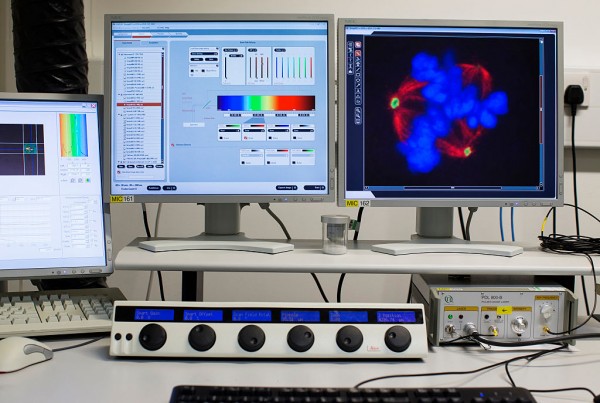Researchers and Clinicians Share Results of Study on Ovarian Cancer, the Latest in Symptoms and Treatment Options

Image of cells through a confocal microscope at the Cancer Research UK Cambridge Institute on December 9, 2014, in Cambridge, England. Confocal microscopes allow scientists to look at cells in more detail and obtain clearer images.
After almost four years of work, a team of University of Colorado researchers and clinicians published this week a paper in the Clinical Cancer Research, sharing findings from a study that looked at how the ovarian cancer tumors' composition changes during a chemotherapy session and adds to a therapeutic reaction.
While the standard of care for ovarian cancer patients, which comprises surgery and chemotherapy, is typically effective, recurrence of the disease and resistance is common.
Also, according to the study, the American Cancer Society said, ovarian cancer is ranked No. 5 in terms of cancer deaths in women, "Accounting for more mortalities than any other female reproductive system cancer."
This year, reports said, it is approximated that more than 13,900 "women will die from ovarian cancer." Presently, there is an unmet conical need to forecast patients' response to chemotherapy, which was the researchers' focus in their study.
Nearly all patient participants responded initially, but almost all patients, the research found, will persist. On the other hand, the research team indicated that "a small percentage of patients will never recur" or stay in remission for more than five years.
UC Study Corresponding Author and Cancer Center Member Benjamin Bitler, Ph.D. added, they are currently working to be able to predict a reaction of patients to chemotherapy more effectively.
ALSO READ: Study Sheds Light on How Malfunctioning Components in DNA Cause Cancer
The Team's Ultimate Goal in Their Study
The team of researchers and clinicians started their work in 2016 to focus on determining potential biomarkers or pathways to forecast better how the tumor of a patient would react to the therapy.
Such information could change preservation and investigation and take a step towards the exact medical procedure for every patient.
The team's ultimate goal, explained by Bitler, is that someone diagnosed with ovarian cancer, "would be able to come in and take the primary tumor."
Another ultimate goal is to use the two major technologies. The study authors described as "transcriptomics using Nanostring" and IHC or multi-spectral immunohistochemistry to know what is being expressed and what the tumor microenvironment appears like.
DON'T MISS THIS: 6 Reasons Why You're Gaining Weight Unintentionally
Screening Ovarian Cancer
Different from the other gynecologic cancers, there are no specific screening tests for ovarian cancer. Some women who are diagnosed with ovarian cancer may have elevated CA 125 protein levels. Still, the linked blood test is not exact enough to screen ovarian cancer, as many noncancerous conditions can upsurge the CA 125 level.
It is difficult to detect ovarian cancer in its early stages because if its "young vague symptoms," which may frequently be mistaken for a more typical condition that's benign.
Abdominal Bloating and Pain
According to Mayo Clinic, women are likely to experience "constipation, abdominal bloating, early satiety after eating" and ache. Other symptoms may include discomfort in the pelvic area, bowel movement changes, and the frequent need to urinate, among others.
While a feeling of discomfort during a menstrual period is expected, any pelvic ache combined with the other symptoms mentioned would be yet another reason to call for help from a primary health care provider. This is probably an ideal time to set an appointment with a gynecologist.
IN CASE YOU MISSED THIS: Is Excessive Exercise Linked to Eating Disorders? Here's What Studies Say
Check out more news and information on Cancer on MD News Daily.
Sep 17, 2020 07:40 AM EDT





